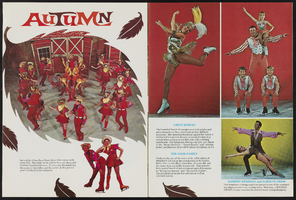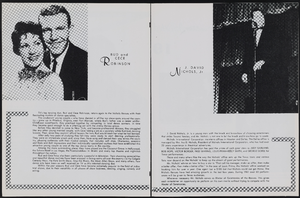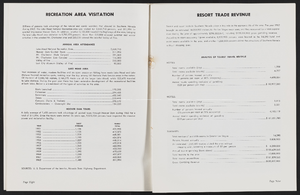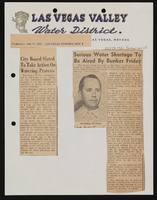Search the Special Collections and Archives Portal
Search Results
Juanita Fain oral history interview
Identifier
Abstract
Oral history interview with Juanita Fain conducted by Claytee D. White on November 19, 2021 for the African Americans in Las Vegas: A Collaborative Oral History Project. In this interview, Fain recalls her childhood in Newark, New Jersey and earning a doctorate degree in Higher Education administration from The Ohio State University. After she was hired by Carol Harter at Ohio State in 1980 as Director of Financial Aid, she came to the University of Nevada, Las Vegas (UNLV) in 1996 as Dean of Enrollment and Management. After various positions, she became Vice President of Student Affairs and in 2021, Interim Chief Diversity Officer was added to her responsibilities. Fain will retire in 2023 after serving her final year as a Special Liaison to President Whitfield.
Archival Collection

Transcript of interview with Morris "Moe" Dalitz by Brenda Baxter, November 4, 1977-March 30, 1978
Date
Description
Interview with Morris "Moe" Dalitz by Brenda Baxter, on several dates in late 1977 to early 1978. In this interview, Dalitz talks about his business and career endeavors before coming to Las Vegas, which included a laundry service and military service. Dalitz partnered with Wilbur Clark and became a successful hotel and casino owner in Las Vegas, as well as a real estate developer with properties including the Boulevard Mall and Sunrise Hospital.
Moe Dalitz was born in Boston in 1899, and soon after his family moved to Detroit, Michigan and where his father started a linen supply company. In 1930, during Prohibition, Moe moved to Cleveland, Ohio and he became involved with the then-illegal liquor business. At the age of 41, Dalitz enlisted in the Army and was stationed at Governors Island. Moe was put in charge of laundries and dry cleaning because of his experience in the laundry business. He played an important role in creating mobile laundry units that were used in the front lines in North Africa. His ingenuity won him a non-combatant award for his "unusual interest, ingenuity and talents" applied during his service. At the end of war, Moe returned to Cleveland, where his partners were successfully carrying on their business. It was then that they decided to go into the casino-nightclub business, opening nightclubs in Ohio and Kentucky. A couple years later, Moe and his partners met Wilbur Clark and agreed to finance his inactive project in Las Vegas. Thus, in 1950, the Desert Inn Hotel and Casino opened, and Moe Dalitz ushered in a new era for the city. Moe and partners continued to elevate the sophistication of the Strip when they acquired the operating lease to, and later part ownership of, the Stardust Hotel and Casino. Moe was instrumental in bringing the French Lido de Paris show to the Stardust, which was considered the most spectacular nightclub show produced in Las Vegas at its time. In addition to his gaming industry ventures, Moe engaged in significant real estate development, along with partners Allard Roen, Merv Adelson and Irwin Molasky. Their projects included Sunrise Hospital, The Boulevard Mall and Las Vegas Country Club as well as La Costa Resort and Spa in California. At the time of the interview, Moe was involved with the construction of a downtown hotel and casino. Moe Dalitz was the recipient of the Humanitarian Award from the American Cancer Research Center, and supported the Variety Club and the Home of the Good Shepard, amongst other charities.
Text

Transcript of interview with Shelley Berkley by Barbara Tabach, February 13, 2015
Date
Archival Collection
Description
In this interview, Berkley shares her family history, from her great-grandparents? immigration to the United States to her immediate family?s own migration from New York to Las Vegas. She reflects upon her childhood experience in Las Vegas, including her varied leadership positions with Jewish organizations as well as at school, from junior high school through college. Berkley also talks about her involvement as an adult within the Jewish community and more broadly as a public servant, in all levels of government.
Former United States Democratic Congresswoman Shelley Berkley represented Nevada?s 1st Congressional District from 1999 to 2013, an area that includes most of Las Vegas. During her seven terms as a member of the U.S. House of Representatives, the district benefited from millions of dollars of federal funding for education, transportation, and other projects. She also successfully fought against storing nuclear waste at Yucca Mountain in Nevada. Shelley Berkley was born Rochelle Levine in New York City in 1951 and moved to Las Vegas during junior high in 1963. She practiced law in Las Vegas and served in the Nevada Assembly for two years. She was also a member and vice chair of the Nevada University and Community College System Board of Regents. Berkley attended the University of Nevada, Las Vegas where she served as student body president and graduated with honors in 1972 with a B.A. in political science. After obtaining her J.D. in 1976 from the University of San Diego, she returned to Las Vegas to practice law. From 1976 to 1979 Berkley was Deputy Director of the Nevada State Department of Commerce. She provided legal counsel to several casinos at various points in her career, served as national director of the American Hotel-Motel Association, and founded the Southern Nevada Association of Women Attorneys and the Senior Law Project. In 1977 she married Frederic Berkley and had two children, Max and Sam. She remarried in 1999 to Dr. Lawrence Lehrner of Las Vegas, who also had two children from a previous marriage. Before being elected to Congress, Berkley served on the board of the American Israel Public Affairs Committee. She continued her vocal support of Israel in Congress and was heavily involved in all matters related to the Middle East. She was a member of several committees, including: Foreign Affairs, Veterans Affairs, Ways and Means, Small Business, and Transportation. Building a new Veterans Administration medical complex in Southern Nevada and sponsoring many pieces of healthcare legislation are also among her accomplishments as a U.S. Representative. In 2013, she was appointed CEO and Senior Provost of the Touro College and University System?s Western Division.
Text

Interview with Stuart C. Black, January 18, 2005
Date
Archival Collection
Description
Text






